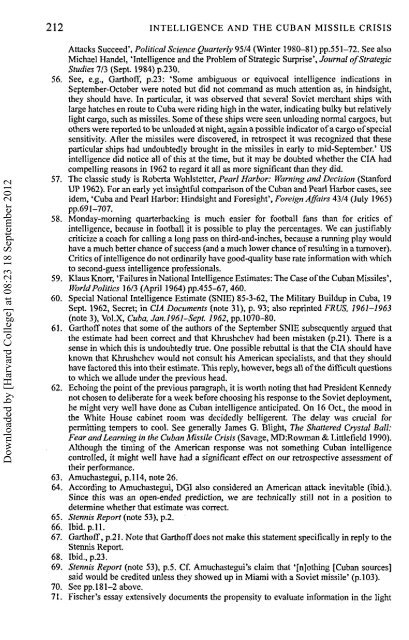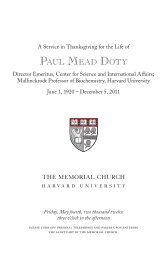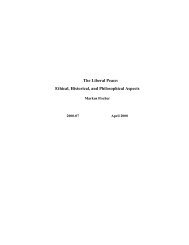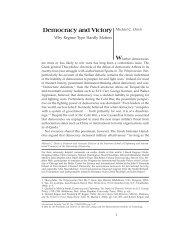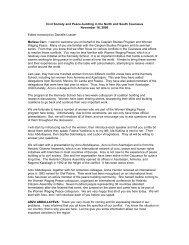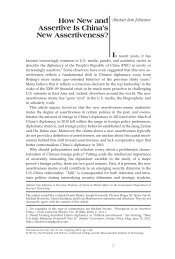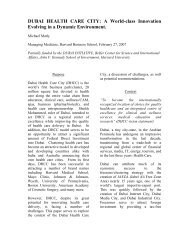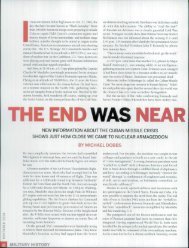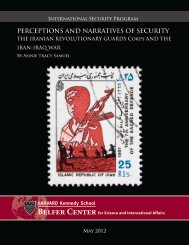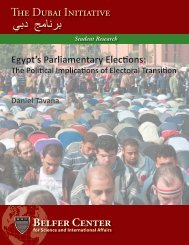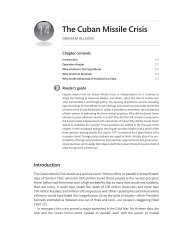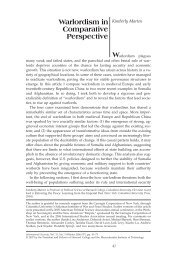The Cuban missile crisis and intelligence performance
The Cuban missile crisis and intelligence performance
The Cuban missile crisis and intelligence performance
Create successful ePaper yourself
Turn your PDF publications into a flip-book with our unique Google optimized e-Paper software.
Downloaded by [Harvard College] at 08:23 18 September 2012<br />
212 INTELLIGENCE AND THE CUBAN MISSILE CRISIS<br />
Attacks Succeed', Political Science Quarterly 95/4 (Winter 1980-81) pp.551-72. See also<br />
Michael H<strong>and</strong>el, 'Intelligence <strong>and</strong> the Problem of Strategic Surprise', Journal of Strategic<br />
Studies 7/3 (Sept. 1984) p.230.<br />
56. See, e.g., Garthoff, p.23: 'Some ambiguous or equivocal <strong>intelligence</strong> indications in<br />
September-October were noted but did not comm<strong>and</strong> as much attention as, in hindsight,<br />
they should have. In particular, it was observed that several Soviet merchant ships with<br />
large hatches en route to Cuba were riding high in the water, indicating bulky but relatively<br />
light cargo, such as <strong>missile</strong>s. Some of these ships were seen unloading normal cargoes, but<br />
others were reported to be unloaded at night, again a possible indicator of a cargo of special<br />
sensitivity. After the <strong>missile</strong>s were discovered, in retrospect it was recognized that these<br />
particular ships had undoubtedly brought in the <strong>missile</strong>s in early to mid-September.' US<br />
<strong>intelligence</strong> did notice all of this at the time, but it may be doubted whether the CIA had<br />
compelling reasons in 1962 to regard it all as more significant than they did.<br />
57. <strong>The</strong> classic study is Roberta Wohlstetter, Pearl Harbor: Warning <strong>and</strong> Decision (Stanford<br />
UP 1962). For an early yet insightful comparison of the <strong>Cuban</strong> <strong>and</strong> Pearl Harbor cases, see<br />
idem, 'Cuba <strong>and</strong> Pearl Harbor: Hindsight <strong>and</strong> Foresight', Foreign Affairs 43/4 (July 1965)<br />
pp.691-707.<br />
58. Monday-morning quarterbacking is much easier for football fans than for critics of<br />
<strong>intelligence</strong>, because in football it is possible to play the percentages. We can justifiably<br />
criticize a coach for calling a long pass on third-<strong>and</strong>-inches, because a running play would<br />
have a much better chance of success (<strong>and</strong> a much lower chance of resulting in a turnover).<br />
Critics of <strong>intelligence</strong> do not ordinarily have good-quality base rate information with which<br />
to second-guess <strong>intelligence</strong> professionals.<br />
59. Klaus Knorr, 'Failures in National Intelligence Estimates: <strong>The</strong> Case of the <strong>Cuban</strong> Missiles',<br />
World Politics 16/3 (April 1964) pp.455-67, 460.<br />
60. Special National Intelligence Estimate (SNIE) 85-3-62, <strong>The</strong> Military Buildup in Cuba, 19<br />
Sept. 1962, Secret; in CIA Documents (note 31), p. 93; also reprinted FRUS. 1961-1963<br />
(note 3), Vol.X, Cuba, Jan.l961-Sept. 1962, pp.1070-80.<br />
61. Garthoff notes that some of the authors of the September SNIE subsequently argued that<br />
the estimate had been correct <strong>and</strong> that Khrushchev had been mistaken (p.21). <strong>The</strong>re is a<br />
sense in which this is undoubtedly true. One possible rebuttal is that the CIA should have<br />
known that Khrushchev would not consult his American specialists, <strong>and</strong> that they should<br />
have factored this into their estimate. This reply, however, begs all of the difficult questions<br />
to which we allude under the previous head.<br />
62. Echoing the point of the previous paragraph, it is worth noting that had President Kennedy<br />
not chosen to deliberate for a week before choosing his response to the Soviet deployment,<br />
he might very well have done as <strong>Cuban</strong> <strong>intelligence</strong> anticipated. On 16 Oct., the mood in<br />
the White House cabinet room was decidedly belligerent. <strong>The</strong> delay was crucial for<br />
permitting tempers to cool. See generally James G. Blight, <strong>The</strong> Shattered Crystal Ball:<br />
Fear <strong>and</strong> Learning in the <strong>Cuban</strong> Missile Crisis (Savage, MD:Rowman & Littlefield 1990).<br />
Although the timing of the American response was not something <strong>Cuban</strong> <strong>intelligence</strong><br />
controlled, it might well have had a significant effect on our retrospective assessment of<br />
their <strong>performance</strong>.<br />
63. Amuchastegui, p.114, note 26.<br />
64. According to Amuchastegui, DGI also considered an American attack inevitable (ibid.).<br />
Since this was an open-ended prediction, we are technically still not in a position to<br />
determine whether that estimate was correct.<br />
65. Stennis Report (note 53), p.2.<br />
66. Ibid. p. 11.<br />
67. Garthoff, p.21. Note that Garthoff does not make this statement specifically in reply to the<br />
Stennis Report.<br />
68. Ibid., p.23.<br />
69. Stennis Report (note 53), p.5. Cf. Amuchastegui's claim that '[n]othing [<strong>Cuban</strong> sources]<br />
said would be credited unless they showed up in Miami with a Soviet <strong>missile</strong>' (p.103).<br />
70. See pp.181-2 above.<br />
71. Fischer's essay extensively documents the propensity to evaluate information in the light


